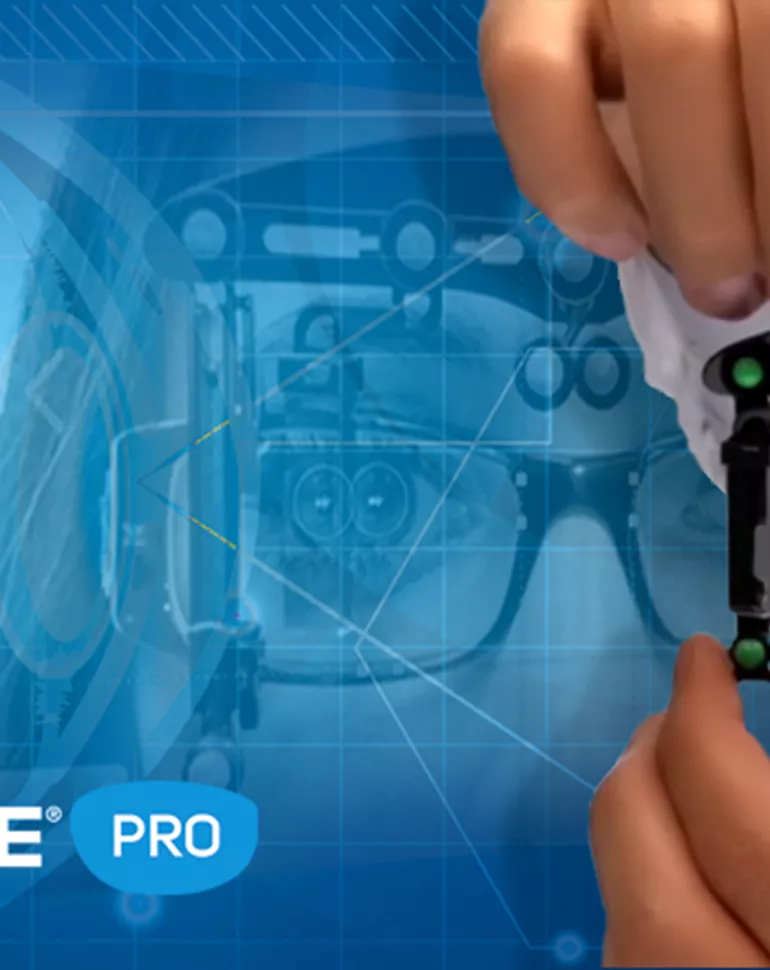As part of our ongoing Spectangle PRO blog series, we are interviewing practices that have successfully implemented Spectangle PRO. Take these success stories and make them your own!
Special thanks to Dr. David Anderson, a partner at Miamisburg Vision Care in Miamisburg, OH, for taking the time to share his experience with Spectangle PRO.
Implementing Spectangle PRO
Hoya Vision Care (HVC): Dr. Anderson, thank you for taking the time to talk with us today. Can you tell us about your initial rationale for implementing Spectangle PRO in your practice?
Dr. Anderson: First we looked at the technology in the practice. Overall we are very high-tech. We have the latest diagnostic and testing equipment. When we looked at the optical, it was obviously behind the times especially in relation to the rest of the patient experience we were delivering. A patient will have one experience with the doctors, and then come out to the optical where the staff is using a pen, PD stick, and a pupilometer that sometimes doesn’t work.
On top of that, we are offering the best, most technologically advanced lenses, and that was another experience disconnect for the patient. Plus, if we’re offering the best lenses it is reasonable to want the most accurate measurements, so we should use the most accurate tool.
HVC: When it comes to implementing new equipment or processes in a practice there can be staff resistance. Can you describe what it took to gain staff acceptance? And how did you handle motivation, incentives, and training?
Dr. Anderson: Thinking way back to when we first implemented our EHR system, essentially at the time you’re asking the staff to work harder for the same pay. Of course, nobody likes that.
What we did then and similarly with Spectangle PRO and anything new we implement, is we really convey the “why” to the staff. It is so important for them to understand the purpose of the change. We discussed the challenges faced and the reasons patients give for walking out with only their prescription.
Everyone felt like they were getting burned on, “It’s cheaper elsewhere.” I told them, well there is a difference at other places, they do it the old cheap way. We discussed the need to keep up with technology. Just as people get rid of old phones to buy new ones, the reason is the technology is better, and that’s what people want. Therefore we need to try new tools, be more accurate and show patients why the way we do things, the new high-tech way, is worth it.
Everyone saw that we needed to be better and provide a better patient experience so they could justify purchasing their glasses from us. If we’re using the most high-tech lenses, let’s make sure we’re giving the benefit of those lenses by ensuring the fit is perfect.
As for incentives, as we’ve done in the past, when we would add something new we would shoot for a benchmark and the whole practice was involved in and rewarded when the practice achieved the goal. In this case, we tied the incentive to increasing premium lens sales.
HVC: Helping people understand “why” can be most of the battle! Tell us how it worked out. What was the impact on revenue and premium product sales?
Dr. Anderson: Because we explained the changes well, measuring became natural for the staff. We measure everyone. And we saw immediate, increased conversation around better product options between the staff and patients and a large increase in premium product sales followed.
Spectangle PRO Results for Dr. Anderson
HVC: Impressive! Tell us how your patients reacted. Did you hear any comments, compliments, or push back?
Dr. Anderson: I need to tell you we did something a little different. We charge patients for the measurements. And at first, the staff was hesitant to charge extra. We went back to the “why” we’re doing this and that is high-tech lenses only work with proper measurements. It is the same as your smartphone, it only works with the latest software updates.
It turned out the feedback was not on cost; it was on the “wow” around how the glasses were being fitted. The $10 for measurements as a component of the refraction gave us an opportunity to marry the refraction to the frame and the fitting. Now there is a strong bond between the patient experience with the optometrist and the patient experience with the optician. Plus, our patients liked the photos. The image with the EY-Stick is fun to send to family and friends to help with the glasses selection.
An additional benefit we weren’t expecting was the validation of purchase. After a week or two goes by the patient comes back to pick up their glasses and they ask, “Is this really what I ordered?” And for us, it is easy to look like a good guy by bringing up the frame fit photos so they can see the optical goods in hand are exactly what they asked for at the time.
HVC: What has been the impact on your practice’s brand?
Dr. Anderson: The biggest thing is the Hoya brand products makes it all fit together now. Everything is electronic, the whole experience, exam, retina photos, sign in, EHR—all this tech had a gap previously! Old school measuring didn’t fit everything else we did. Pulling out the iPad to get the perfect fit for their Hoya lenses matched the brand of everything else the patient experienced.
HVC: So Spectangle PRO “completes you?”
Dr. Anderson: Well, it is showing me the money!
Thanks again to Dr. Anderson for taking the time to talk with us about implementing Spectangle PRO. You can take the lessons he learned and apply them to your practice, or inject your own personality and brand into the process. Either way Spectangle PRO offers your practice a unique opportunity to build your technological brand while removing the disconnect between technologically advanced lenses and outdated, analog measurement tools.
